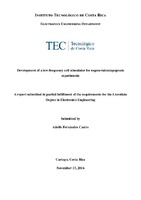Development of a low-frequency cell stimulator for regeneration/apoptosis experiments
Resumen
Cellular stimulation by exposition to variable frequency electric fields constitutes a method for
modifying cellular characteristics such as metabolism, orientation, migration and biological
function. For this type of study and behavior, high-cost and complex commercial equipment is often
used, which shows in general low bandwidth that limits the scope of the experiments.
This work presents the design and implementation of a prototype for electric stimulation and
impedance measurement of cell samples characterized by low-cost, portability, and easy
reconfigurability of frequency and voltage, which makes it suitable for stimulation studies and
research purposes. Also, it constitutes a preliminary study for systems with higher bandwidth, higher
impedance range, and more input channels. The device is designed and implemented in order to
carry out experiments of regeneration and apoptosis. It can generate electric signals up to 40 kHz at
voltages in the range from 0 V to 100 mV, and it is capable of measuring impedance up to 1 M
.
Experiments of cellular stimulation and impedance measurement were carried out over yeast
cultures, and the results are compared with the ones obtained by the Agilent 4284A LCR meter.
Descripción
Proyecto de Graduación (Licenciatura en Ingeniería Electrónica) Instituto Tecnológico de Costa Rica. Escuela de Ingeniería Electrónica, 2016.


